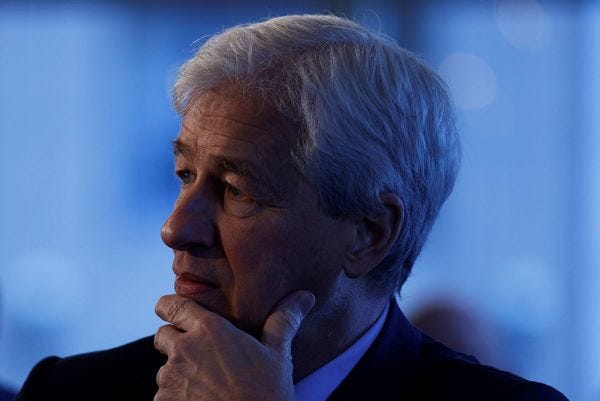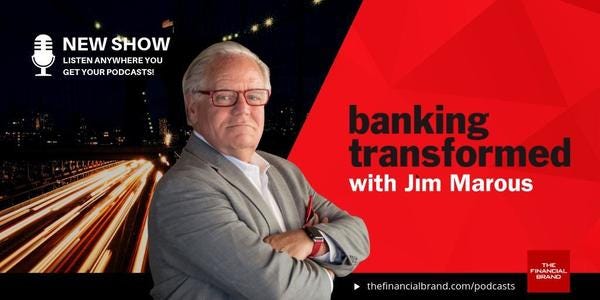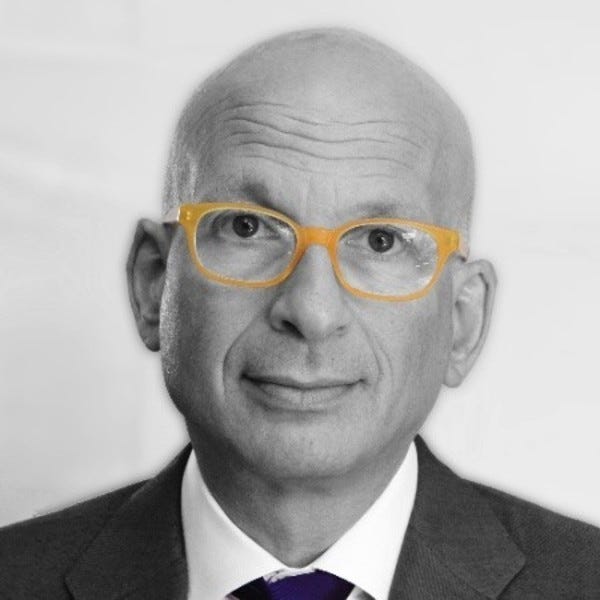It was the best of times, it was the worst of times...
Why a forthright CEO is marketing’s greatest asset, and most dangerous threat
☀️ 🥶 Happy Sunday from a sunny yet cold corner of South West London. Here is the week’s news likely to impact you.
👉🏻 Read on to learn why:
① A popular spokesperson can quickly turn into a liability but…
② …the alternative is even worse.
③ Opinions should be fact-based and promote solutions.
④ Venture capital is funding a broader range of ideas than ever.
⑤ Blockchain is set to streamline and democratise payments.
⑥ Purpose, messaging and community are keystones.
⑦ Good marketing is factual and empathetic.
What's new?
This week, JP Morgan CEO Jamie Dimon marked the bank’s 100-year anniversary by making a jibe at China’s ruling party. Reuters has the story.
Jamie Dimon. Source: Reuters, 25 November 2021
In short:
“Jamie Dimon said on Wednesday he regretted his remarks that the Wall Street bank would last longer than China’s Communist Party (CPC), moving quickly to avoid any longer-term fallout.”
“Dimon’s comments had risked jeopardizing JPMorgan’s growth ambitions in China where it won regulatory approval in August to become the first full foreign owner of a securities brokerage in the country.”
“China experts in the United States said his quick apology should ensure no serious damage was done. ‘I regret and should not have made that comment. I was trying to emphasize the strength and longevity of our company,’ Dimon said in a statement issued by the bank.”
Why does it matter?
① This is not the first time Dimon has appeared in these pages and it won’t be the last. I love him. He’s smart, opinionated, outspoken and occasionally flippant and a little foolhardy. That’s what makes him so alluring to journalists and lowly marketing bloggers alike. His (soon rectified so no harm done) faux pas this week is a reminder to communications professionals everywhere how quickly a popular spokesperson can turn into a liability.
Indeed, for an example of a CEO who - in public relations at least - is a threat more often than he is an asset, we only have to look to Tesla. Elon Musk was his usual trolling self on Twitter this week, inexplicably having a little jibe at Binance CEO Changpeng Zhao.
@CoinDesk @binance @egreechee Hey @cz_binance, what’s going on with your Doge customers? Sounds shady.
Musk got more than he bargained for though when CZ responded in kind: with a link to a Guardian story about a Tesla software glitch that prompted a safety recall for nearly 12,000 cars. How many of CZ’s 4.1 million followers will think twice about buying a Tesla?
@elonmusk @CoinDesk @binance @egreechee Elon, we are pretty certain it is an issue with the latest #doge wallet. We are in communications with the devs. Apologies for any inconvenience that may have caused you.
What happened here? 👀https://t.co/g2J50zqbEu
② CEOs insulting foreign governments or squabbling with each other on social media is neither dignified nor helpful to their respective Communications teams. But there is something worse than a trigger happy CEO: the CEO that is so measured and considered that he or she holds no appeal to the media or the public at all.
With most marketing and communications now centred on creating ‘content’ - that is to say, opinions and insights - that will be widely shared on social media and in the press, identifying and enabling those spokespeople with ideas and the will to express them is critical.
What's next?
1. Take action
Nurture any member of your senior team (indeed, I’d argue any member of your team, regardless of seniority) with strong opinions and a talent for communicating them publicly - especially if they can do it with humility, empathy and a sense of humour. They are your greatest PR assets. They are the people who will go out into the world and be heard, they have the potential to be your best ambassadors. But they need some guide rails and it’s your Marketing team’s job to provide them.
③ This can be as simple as a reminder list of do’s and don'ts. For example:
Do: ensure your arguments are fact-based, promote solutions, praise the positive, identify opportunities, be kind, be courteous.
Don’t: criticise elected officials or competitors, moan, joke about religion or politics, be cynical or appear bitter.
Common sense? Perhaps. But you’d be surprised how quickly common sense can desert even an experienced executive when a microphone is shoved in their face or they’re playing to a crowd.
2. Get help
Visit InMarketing, my resource library for leaders in finance or technology who want to innovate, interact and influence.
If you have a question, just hit ‘reply’ or send me a tweet. I always do my best to answer.
3. Share
Can I ask you a favour, dear reader? If you found this useful or know someone who would, please share it and help grow the community of regular IMTW readers.
What else?
Three other articles that are worthy of your time.
FINANCE
The bright new age of venture capital
④ Venture capital is changing and funding a broader range of ideas than ever.
Source: The Economist, 25 November 2021
“Global venture investment is on track to hit an all-time high of $580bn this year. That is nearly 50% more than was invested in 2020, and about 20 times that in 2002.”
“It was once the preserve of niche venture-capital firms run in Silicon Valley. Now, deals led or solely struck by private-equity shops, hedge funds and others that used to conduct little venture activity are on track to nearly double from $144bn in 2020 to $260bn this year. That accounts for a staggering 44% of global VC activity, up from 20% in 2002.”
“The frenzy is a result of both the entrance of new competitors and greater interest from end-investors. That in turn reflects the fall in interest rates across the rich world, which has pushed investors into riskier but higher-return markets. Company founders, for their part, have gained bargaining power as investors compete.”
Dive deeper:
TECHNOLOGY
What is a central bank digital currency?
⑤ Blockchain is set to streamline and democratise payments.
Source: The FinTech Times, 22 November 2021
“A CBDC is a new type of currency, working in tandem with fiat currencies used worldwide. CBDCs operate on a blockchain, creating a token of the country’s currency and recording all transactions of that token in an immutable way.”
“The digital currencies could leverage frontier technologies for the development of features such as programmable money, more inclusive payments services, and more robust and resilient payments infrastructure.”
“Where crypto and CBDCs vary is that no central entity can turn users away from the blockchain, whereas governments use permissioned blockchain technology to limit who can view and who can change the blockchain.”
MEDIA & MARKETING
What financial institutions can learn from TD Bank’s marketing playbook
⑥ Purpose, messaging and community are marketing keystones.
Source: The Financial Brand, 23 November 2021
TD Bank’s CMO, Tyrrell Schmidt, spoke to Jim Marous:
Purpose: “Purpose has never been more important. To me, it’s no longer simply something some companies differentiate themselves on. Every company has to be purpose driven.” At least three out of five customers (60%) value how brands behave, and that what they see will ultimately influence how they think and make purchases in the future.
Messaging: “You’ll often hear our CEO say ‘TD is not in the business of selling a mortgage or signing one more checking account. We’re actually in the business of helping people become homeowners and enabling them to meet their goals.‘”
Community: “We’ve sent reopening kits to our small businesses, just as a bit of a surprise and delight. We wanted them to know that we were there for them.“
Well said
⑦ Seth Godin, on why marketing is a service:
Seth Godin. Source: LinkedIn
“When you care enough to see your audience with empathy, you’ll realize that they’re not happier if you simply recite a list of facts. Almost everything we engage with is a placebo at some level, and bringing a human-friendly story to the interaction is a way to serve people.”
One more thing...
Source: Unsplash
FSTech reports that Atom Bank has become the largest company in Britain to introduce a four-day working week. The FinTech’s new working week means employees can work 34 hours across 4 days compared to their former 37.5 hour five-day week. All of its 430 employees will benefit, with no reduction in salary.
Off cuts
The stories that almost made this week’s newsletter.
FINANCE
💷 BoE governor says ‘regulated’ CBDC preferred option
📈 London attracts first Spac after rule change
🇪🇺 Brexit is a slow bleed for the City of London
🤑 Citi plans to hire 100 staffers for beefed-up crypto division
🇺🇸 Why European banks have failed to crack the US
TECHNOLOGY
📱 Millennials now trust fintechs as much as banks
🏦 The opportunities CBDC presents for fintechs
💶 European Council approves two digital asset proposals
🤲🏻 UK Finance pushes for regulation in Open Banking strategy
🤝 Young don’t want online banking to replace human interaction
MEDIA & MARKETING
👋 Clubhouse is more exclusive than ever: No one’s on it
✒️ How to make content a more effective part of your sales funnel
👨🏼💻 Optimise your website for lead generation
😲 Paid media campaigns grow 37% in 2021
⛓ When the blockchain calls, how will social marketing answer?
Don’t settle for marketing.
Aspire to InMarketing: innovate, interact, influence.
Have a productive week.










